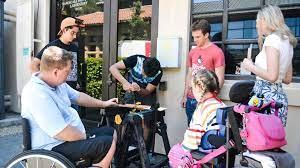Blogs Home »
Browse Blogs »
Overcoming challenges:empowering youth with disabilities
Empowering youth with disabilities involves addressing various challenges to ensure they have equal opportunities, support, and resources to thrive. Here are some strategies to overcome these challenges:
-
Education and Awareness:
- Community Awareness: Foster awareness about different disabilities to reduce stigma and promote inclusivity.
- School Programs: Implement inclusive education programs that cater to diverse learning needs, ensuring all students, including those with disabilities, receive quality education.
-
Accessible Infrastructure:
- Universal Design: Design public spaces, schools, and transportation systems with universal accessibility in mind.
- Assistive Technology: Provide and promote the use of assistive devices and technologies to enhance independence and accessibility.
-
Vocational Training and Employment:
- Skill Development: Offer vocational training programs tailored to the abilities and interests of individuals with disabilities.
- Inclusive Hiring Practices: Encourage and support businesses to adopt inclusive hiring practices and provide reasonable accommodations.
-
Healthcare and Rehabilitation:
- Accessible Healthcare: Ensure healthcare facilities are accessible and staff is trained to meet the specific needs of individuals with disabilities.
- Rehabilitation Services: Provide comprehensive rehabilitation services to help individuals with disabilities achieve their highest level of independence.
-
Legal and Policy Support:
- Anti-Discrimination Laws: Advocate for and enforce anti-discrimination laws that protect the rights of individuals with disabilities.
- Inclusive Policies: Develop and implement policies that promote inclusivity and equal opportunities in all aspects of life.
-
Peer Support and Mentoring:
- Peer Mentoring Programs: Establish programs that connect youth with disabilities to mentors who have successfully navigated similar challenges.
- Peer Support Groups: Create support groups where individuals with disabilities can share experiences, advice, and encouragement.
-
Community Engagement:
- Sports and Recreation Programs: Develop inclusive sports and recreation programs to foster social inclusion and physical activity.
- Cultural and Arts Inclusion: Promote participation in cultural and artistic activities to enhance creativity and self-expression.
-
Financial Inclusion:
- Financial Literacy Programs: Provide financial education tailored to the needs of individuals with disabilities to enhance their economic independence.
- Microfinance Opportunities: Support initiatives that provide financial resources to individuals with disabilities for entrepreneurship and small business ventures.
-
Family and Social Support:
- Family Education: Educate families about the needs and capabilities of individuals with disabilities to foster understanding and support.
- Social Inclusion Programs: Encourage community-based programs that facilitate social interactions and friendships among individuals with and without disabilities.
-
Advocacy and Empowerment:
- Self-Advocacy Training: Provide training to individuals with disabilities on self-advocacy skills, enabling them to express their needs and rights.
- Leadership Opportunities: Create platforms for youth with disabilities to take on leadership roles in community organizations and decision-making processes.
By addressing these aspects, societies can work towards creating an inclusive environment that empowers youth with disabilities to reach their full potential. Collaboration among government agencies, NGOs, businesses, and communities is crucial in making these initiatives successful.

